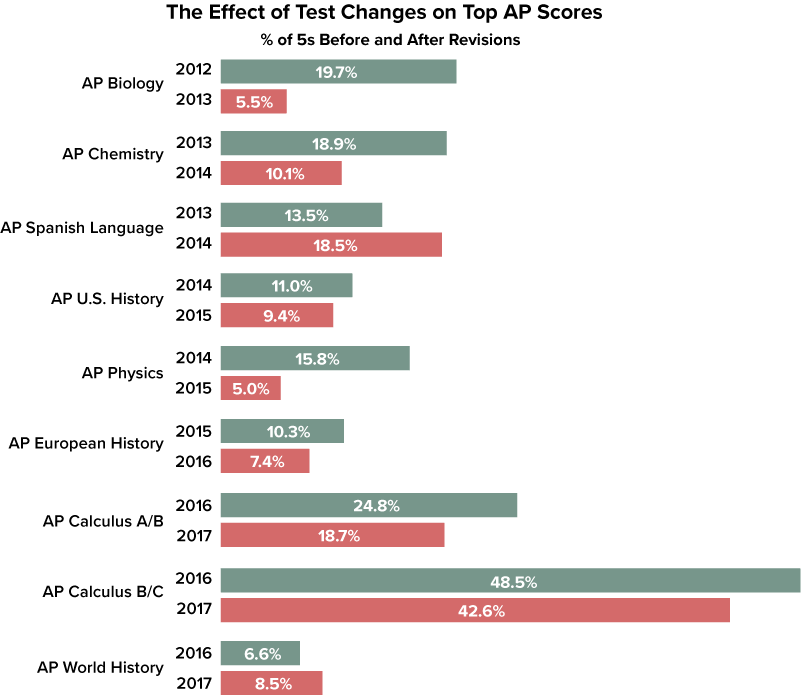Compass research has shown that revisions to Advanced Placement tests often reduce the number of students earning the top scores needed for college credit. We look at the effect of previous changes and what is on the horizon for 2018 and 2019.
Why are AP courses and exams revamped?
As the number of students taking Advanced Placement courses has increased over the last decade, so have the expectations of colleges. At many top universities, even a 4 is not enough to earn college credit. [College Board maintains this tool for researching AP policies.] College Board has worked with teachers and professors to ensure that AP courses remain relevant and aligned with the expectations of college classes. This effort has meant a lot of change. Of the 20 APs with more than 50,000 test takers, 9 have been overhauled in the last 5 years and U.S. Government and Politics will be revised for the 2018-2019 academic year. U.S. History (2015), European History (2016), and World History (2017) are receiving additional modifications this year because of criticism from teachers about the scope of content covered and skills expected.
Dips in top scores.
The changes have not come without disruption. The most common result of a test change is a decline — particularly in an exam’s first year — in the number of top scores. The results in the sciences, for example, were upended as College Board overhauled each subject, in turn. The number of students receiving 5s decreased by 62% in the first year of the revised AP Biology (2013) exam, 47% in the case of AP Chemistry (2014), and 68% in the case of AP Physics (2015).
Below is a look at the 9 most popular exams overhauled in the last 5 years and the percentage of students earning top marks.

Only World History (2017) and Spanish Language and Culture (2014) saw higher percentages of 5s. In fact, almost 40% more students received 5s on the revised Spanish Language exam than had in the previous year. There are reasons why exams must be updated periodically, but it can be frustrating to students to find such discrepancies from one year to next. It is unlikely that the AP Spanish Language students in 2014 were that different from those in 2013, but the former ended up with far more credit-eligible scores.
Are the dips in scoring permanent?
The evidence here is mixed. In the case of the sciences, there have been only minor improvements in the years after the overhauls. It is unlikely that we will again see 15-20% of students receiving 5s in Biology, Chemistry, or Physics 1. The figures now seem steady in the 5-10% range.
In the cases of U.S. History and European History, the percentages of students receiving 5s dipped in the introductory year of each revised exam but rebounded to historic norms in subsequent years. This indicates that teachers and students were eventually able to adapt to the new content and skills being tested. That’s cold comfort to the first group of students taking a revised exam. Students in these two subjects are also looking at changes in 2018.
History APs may actually be easier in 2018.
When surveyed by College Board, AP history teachers responded that the current exams have “too many elements…for students to master” and that the essay questions require “too many different tasks.” Although not originally scheduled to have any changes in 2018, the U.S. History, European History, and World History exams will all see modifications. The changes point to “easier” exams — a reduction and clarification of skills tested and streamlined essay questions with more allotted time. We expect this to lead to an uptick in top scores in these exams.
Will there be a rebound in calculus scores?
Calculus AB and Calculus BC were revised in 2017. Despite a record number of test takers, the number of students seeing 5s dipped from 137,118 to 115,672. We will not know until this spring’s test results are in whether that shift will be reversed or whether calculus students will continue to find it more difficult to achieve top marks.
Changes on the horizon
Beyond the history exams, no other major tests were overhauled this year. U.S. Government and Politics will see revisions in the 2018-2019 academic year.
What can students do to improve their scores on revised exams?
Unfortunately, students do not always have the ability to time their AP classes to avoid overhaul years. During changeover years, students must take more personal responsibility for understanding the Course and Exam Descriptions. They should not depend exclusively on previous years’ exams for test preparation, and it is unlikely that commercial test preparation books will fully reflect the new material. Prior exams and materials are still be useful for study purposes, but students must understand how content and grading standards have changed.


I have a question regarding subject tests given recommended but not required at many colleges. If taken with a low score, can the low score count against applicant? Should the decision to take subject tests be more thoughtful?
Julia,
If you are referring to Subject Tests, then you can use Score Choice to decide which ones to send to colleges. No college — that I know of — requires students to send AP scores. Testing should always be thoughtful, but a low score on a Subject Test need not hurt you.
Good Morning! Art – I have a question about AP credits. Our school is considering dropping AP courses and instead, offering dual enrollment classes. I have great concerns about this for many reasons – one of which is that it looks like many colleges don’t accept dual credit offered at the high school ( Duke for example – you have to take course at the college) , there is no cumulative exam (which in my opinion really tests knowledge of material), and I am concerned that many colleges won’t accept dual enrollment courses. Do you have an opinion on this?? I am told dual enrollment is becoming “trendier.” I am more interested in well known, well tested, and commonly accepted rigorous course work.
kim,
I try to recognize the limits of my knowledge, and the issue of AP versus dual enrollment falls outside my limits. It is true that some schools are choosing to forego AP courses — the reasons vary — although I’m not sure that I would call it a trend. We do see some students study for and take APs on their own.